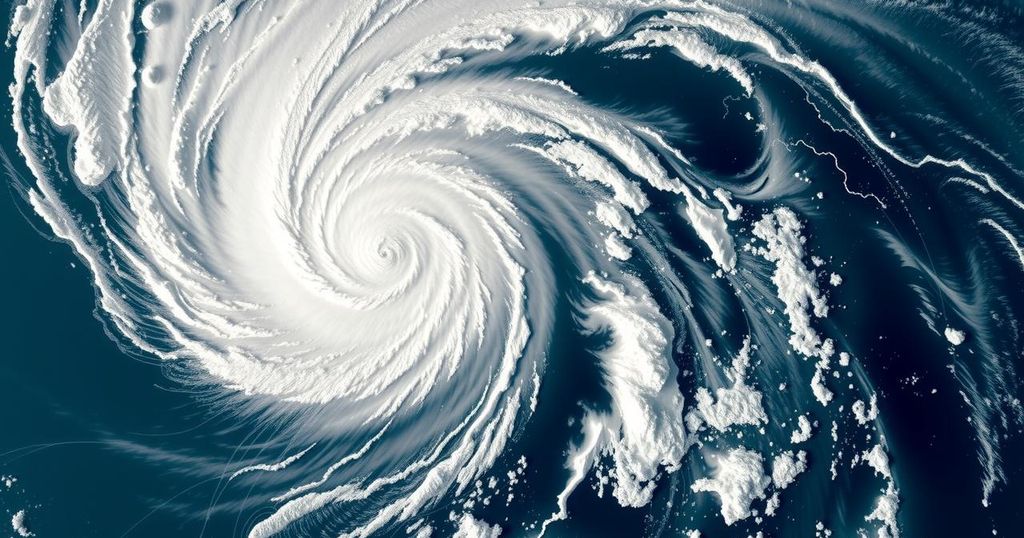Devastating Impact of Cyclone Chido on Mayotte and Beyond
Tropical Cyclone Chido has caused severe damage in Mayotte, with winds over 220 km/h leading to extensive destruction and concerns for the population. Mayotte Prefect described it as the worst cyclone since 1934, and recovery efforts are underway. The cyclone is moving towards Mozambique, affecting millions, as authorities prepare for potential flooding and outbreaks of waterborne diseases.
Tropical Cyclone Chido has significantly impacted the French territory of Mayotte in the Indian Ocean, causing extensive destruction as it approaches the eastern coast of Africa. With winds exceeding 220 kilometers per hour, the cyclone has caused severe damage to infrastructure, including the removal of metal roofs from homes in Mayotte, which has a population of over 300,000 spread across two islands. Despite the scale of destruction, there have been no immediate reports of casualties, prompting officials to reassess emergency measures. Mayotte Prefect Francois-Xavier Bieuville characterized this event as the most destructive cyclone to hit the island since 1934, declaring that many residents have lost everything.
The authorities have lifted the highest alert level, allowing rescue efforts to commence while still maintaining a maximum safety alert for the general population. On social media, Bieuville advised residents to remain sheltered in secure locations, stating, “Only emergency and security services were allowed to go out.” French Interior Minister Bruno Retailleau confirmed the breadth of the damage, noting the mobilization of state and local emergency services to address recovery efforts. Thousands of homes are without power, and many structures have been destroyed, necessitating the deployment of 110 rescuers and firefighters from mainland France and Reunion Island, with an additional 140 expected soon.
Additionally, the nearby nation of Comoros, which is located to the north of Mayotte, is also grappling with the storm’s effects. Authorities in Comoros have issued the highest red alert in some regions, expressing concern for a group of 11 fishermen who have yet to be located. All ships have been advised to remain in port, and the main airport and government offices have been closed. As Cyclone Chido continues on its path, it is projected to impact Mozambique late Saturday or early Sunday, potentially affecting 2.5 million individuals in the northern provinces of Cabo Delgado and Nampula. Other nations, including Malawi and Zimbabwe, are preparing for possible evacuations and flooding as the cyclone advances.
Cyclone season in the southeastern Indian Ocean runs from December through March, bringing heightened risks of humanitarian crises due to flooding and subsequent waterborne diseases. Previous cyclones, such as Idai in 2019, resulted in significant fatalities and infrastructure damage in the region. Recent studies have indicated that the intensity of cyclones is increasing as a consequence of climate change. This poses significant challenges for poorer nations in southern Africa, which contribute minimally to the factors driving climate change yet bear the brunt of its consequences.
Cyclone season in the Indian Ocean is a critical period from December to March, during which numerous severe storms can develop, impacting coastal regions and island territories. The frequency and intensity of these storms have been linked to broader climatic shifts attributed to climate change. Nations in southeastern Africa, particularly the island of Mayotte and neighboring regions, have endured devastating floods and humanitarian crises in the aftermath of past cyclones. Understanding that cyclone-related disasters often lead to epidemics of waterborne diseases underlines the urgent need for effective disaster preparedness and response strategies.
In conclusion, Tropical Cyclone Chido has wreaked havoc in Mayotte and is expected to continue its destructive path toward mainland African countries. The extensive damage to infrastructure underscores the urgent need for coordinated relief efforts and improved preparedness for future cyclones. The broader implications of climate change on the severity of these storms cannot be ignored, as they exacerbate vulnerabilities in already at-risk communities.
Original Source: www.voanews.com




Post Comment